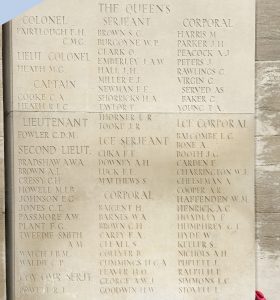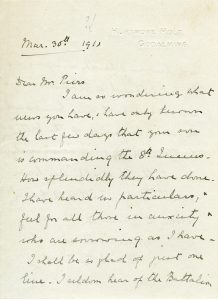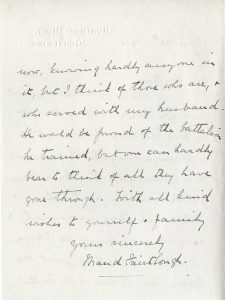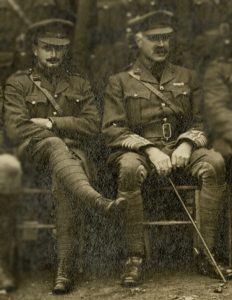Transcription
Mar. 30th. 1919
Dear Mr. Peirs,
I am so wondering what
news you have, I have only known
the last few days that your son
is commanding the 8th. Queens.
How splendidly they have done.
I have heard no particulars, &
feel for all those in anxiety &
who are sorrowing as I have.
I shall be so glad of just one
line. I seldom hear of the Battalion
[page]
now, knowing hardly anyone in
it, but I think of those who are, &
who served with my husband.
He would be proud of the battalion
he trained but one can hardly
bear to think of all they have
gone through. With all kind
wishes to yourself & family
Yours sincerely
Maud Fairtlough.
Commentary
This is an incredibly sad letter. The author is Maud Fairtlough who was the widow of the first commanding officer of the 8th Queen’s. Her husband was Lieutenant-Colonel Frederick Howard Fairtlough who was killed at Loos on 26 September 1915. He died just three weeks after the battalion arrived in France and after training the battalion for a year in England. Fairtlough was an old Boer War veteran who was dug out of retirement to command the 8th Queen’s in September 1914. He and Peirs knew each other from before the war when Peirs was one of his subalterns in the 3rd Battalion of the Queen’s.
In addition to her husband, Maud Fairtlough had three sons who served in the Great War named Gerard, Lancelot, and Eric. Gerard was killed in the war and Lancelot was severely wounded in May 1916. No doubt the loss of both her husband and son weighed heavily upon her. Some families bore disproportionately the suffering of a war that left millions of loved ones grieving for decades afterwards.
In this letter, Maud references her sorrow. She is writing to Hugh Peirs, Jack’s father, but it is not her first correspondence with the family. She wrote to Jack several times in 1915 inquiring about her husband in his final moments of life. Specifically, she was concerned about his body and whether it could be recovered from Loos.

The first of three panels in the Dud Corner Cemetery (Loos-en-Gohelle, France) featuring names of soldiers from The Queens who were killed at Loos in 1915. Photo by Jenna Fleming.
It fell to Jack Peirs to write to Maud of her husband’s death in 1915. It was his grim task to tell her that his body could not be recovered from no man’s land. It never would be – Fairtlough is remembered on a panel at the Loos Memorial with other men from the Queen’s whose bodies, too, were never recovered and/or identified.
Peirs wrote to Maud four days after the 8th attacked at Loos. He expressed to her that the ‘regiment are heart broken at his loss and they ought to be as no man could have raised & trained a Battalion better than he.’ Peirs also felt that it was important to tell Maud that her husband died heroically, though, you can tell that this was a hard letter for him to write. ‘I would give a great deal to have spared you this and I only with that I could break it to you more gently, but you will have the satisfaction of knowing that he died like a gentleman at the head of his men and that his regiment adored him.’
These feelings of affection by the battalion clearly reveal Jack’s own for Fairtlough. Peirs learned how to be an officer by his example and owed his position as second-in-command of the 8th Queen’s to him. Fairtlough, to his credit, recognized Jack’s leadership abilities and saw to it, through promoting him, that if he fell the battalion would have someone to carry the torch forward that he initially lit in 1914.
Source: HJC Peirs to Maud Fairtlough, 30 Sept 1915. Papers of EVH Fairtlough, Vol. 3, Letter 477, IWM.



